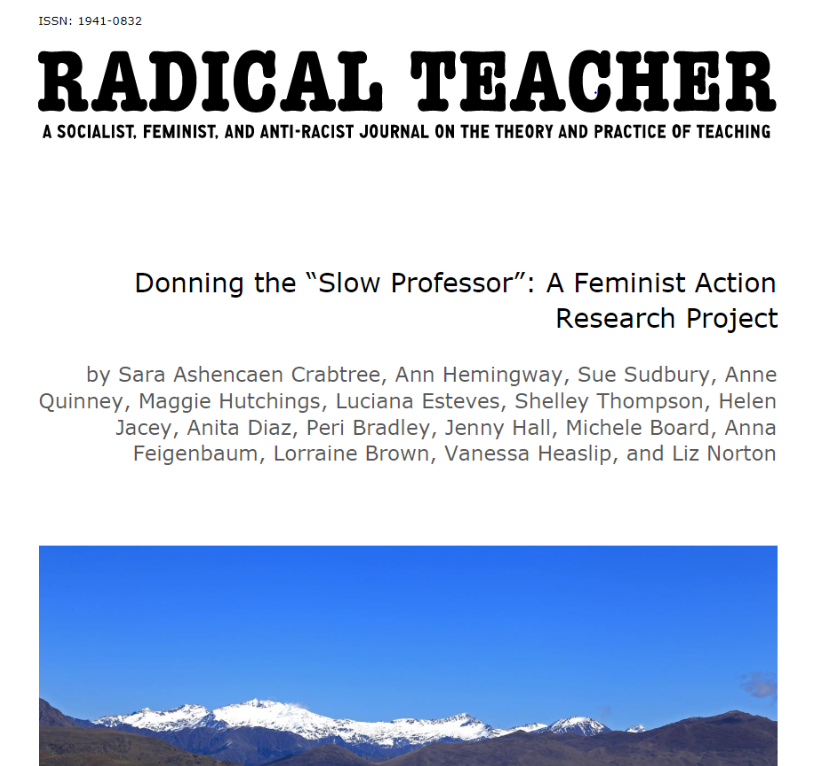 Congratulations to the Bournemouth authors who published the paper ‘Donning the ‘Slow Professor’: A Feminist Action Research Project’ earlier this month [1]. This paper was published in the journal Radical Teacher. The paper argues that the corporatisation of Higher Education has introduced new performance measurements as well as an acceleration of academic tasks creating working environments characterised by speed, pressure and stress. This paper discusses findings from a qualitative, feminist participatory action research (PAR) study undertaken by an interdisciplinary team of women academics at a modern, corporate university in England. The study illuminates how corporatized HE erodes faculty autonomy, degrades learning environments, damages professional satisfaction and health. Strategies for resistance and liberation developed through the PAR process are discussed.
Congratulations to the Bournemouth authors who published the paper ‘Donning the ‘Slow Professor’: A Feminist Action Research Project’ earlier this month [1]. This paper was published in the journal Radical Teacher. The paper argues that the corporatisation of Higher Education has introduced new performance measurements as well as an acceleration of academic tasks creating working environments characterised by speed, pressure and stress. This paper discusses findings from a qualitative, feminist participatory action research (PAR) study undertaken by an interdisciplinary team of women academics at a modern, corporate university in England. The study illuminates how corporatized HE erodes faculty autonomy, degrades learning environments, damages professional satisfaction and health. Strategies for resistance and liberation developed through the PAR process are discussed.
The writing collective for this paper comprised: Sara Ashencaen Crabtree, Ann Hemingway, Sue Sudbury, Anne Quinney, Maggie Hutchings, Luciana Esteves, Shelley Thompson, Helen Jacey, Anita Diaz, Peri Bradley, Jenny Hall, Michele Board, Anna Feigenbaum, Lorraine Brown, Vanessa Heaslip, and Liz Norton.

Reference: Ashencaen Crabtree, S., Hemingway, A., Sudbury, S., Quinney, A., Hutchings, M., Esteves, L., Thompson, S., Jacey, H., Diaz, A., Bradley, P., Hall, J., Board, M., Feigenbaum, A., Brown, L., Heaslip, V., Norton, L. (2020) Donning the ‘Slow Professor’: A Feminist Action Research Project , Radical Teacher, Vol. 116












 Visiting Prof. Sujan Marahatta presenting at BU
Visiting Prof. Sujan Marahatta presenting at BU 3C Event: Research Culture, Community & Can you Guess Who? Friday 20 March 1-2pm
3C Event: Research Culture, Community & Can you Guess Who? Friday 20 March 1-2pm Beyond Academia: Exploring Career Options for Early Career Researchers – Online Workshop
Beyond Academia: Exploring Career Options for Early Career Researchers – Online Workshop UKCGE Recognised Research Supervision Programme: Deadline Approaching
UKCGE Recognised Research Supervision Programme: Deadline Approaching SPROUT: From Sustainable Research to Sustainable Research Lives
SPROUT: From Sustainable Research to Sustainable Research Lives ECR Funding Open Call: Research Culture & Community Grant – Apply now
ECR Funding Open Call: Research Culture & Community Grant – Apply now ECR Funding Open Call: Research Culture & Community Grant – Application Deadline Friday 12 December
ECR Funding Open Call: Research Culture & Community Grant – Application Deadline Friday 12 December MSCA Postdoctoral Fellowships 2025 Call
MSCA Postdoctoral Fellowships 2025 Call ERC Advanced Grant 2025 Webinar
ERC Advanced Grant 2025 Webinar Update on UKRO services
Update on UKRO services European research project exploring use of ‘virtual twins’ to better manage metabolic associated fatty liver disease
European research project exploring use of ‘virtual twins’ to better manage metabolic associated fatty liver disease